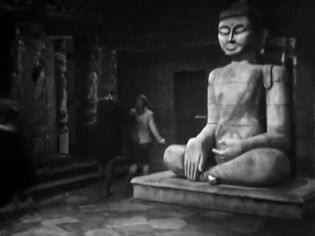Buddhism

Buddhism was an Earth religion whose adherents followed the teachings of Buddha.
Buddhists believed in reincarnation, specifically that they will be reborn over and over again until they are free from suffering and obtain Nirvana, what the Fifth Doctor felt to be close to during his regeneration. (AUDIO: Winter [+]Loading...["Winter (audio story)"]) The Eighth Doctor's companion Charley Pollard described this belief as being "very pagan." (AUDIO: The Natural History of Fear [+]Loading...["The Natural History of Fear (audio story)"])
People
King Ashoka of Magadha converted to Buddhism and spread it throughout Asia. (PROSE: Dharmayuddha [+]Loading...["Dharmayuddha (short story)"])
Marco Polo had a great deal of respect for Buddhist monks. At the Khan's court, he once saw Buddhist monks make cups of wine fly to the Khan's lips. In part because of this experience, Polo told Ian that they alone would have the wisdom to open and use the TARDIS, which he transported overland from the Roof of the World to Cathay. (TV: "The Roof of the World" [+]Part of Marco Polo, Loading...{"namedep":"The Roof of the World (1)","1":"Marco Polo (TV story)"})
K'anpo Rimpoche was the abbot of a Buddhist meditation centre in England, and he helped the Third Doctor regenerate. (TV: Planet of the Spiders [+]Loading...["Planet of the Spiders (TV story)"]) He had the ability to create a guarding projection of his future self before the regeneration process, the Fourth Doctor then was later able to do this too. (TV: Logopolis [+]Loading...["Logopolis (TV story)"])
As a result of his experiences in UNIT, like the one with K'anpo Rimpoche, Brigadier Lethbridge-Stewart adopted Zen Buddhist practices. These helped him resist Vardan mind control as well as giving him a new perspective upon the Doctor and his role in the cosmic order (that is, as a Bodhisattva of Justice and Compassion). (PROSE: No Future [+]Loading...["No Future (novel)"], The Shadows of Avalon [+]Loading...["The Shadows of Avalon (novel)"]) Cousin Dysgenia was told that Zen Buddhism was actually an elaborate joke, the punchline to which was only visible from a specific spatiotemporal location. (PROSE: A Story of the Peace [+]Loading...["A Story of the Peace (short story)"])
The Dalai Lama was an important Buddhist religious figure. (AUDIO: The Natural History of Fear [+]Loading...["The Natural History of Fear (audio story)"])
Places
The Cave of the Thousand Buddhas was located close to Tun-Huang, and was famous enough that both Marco Polo and Barbara Wright, two Europeans separated by both geography and time, knew of it. (TV: "Five Hundred Eyes" [+]Part of Marco Polo, Loading...{"namedep":"Five Hundred Eyes (3)","1":"Marco Polo (TV story)"})
The Det-Sen in Tibet was a Buddhist monastery. (TV: The Abominable Snowmen [+]Loading...["The Abominable Snowmen (TV story)"])
Objects and iconography
Among the prizes that the First Doctor obtained during a game of backgammon against Kublai Khan in the 1289 was the sacred tooth of Buddha which Marco Polo had brought from India. (TV: "Assassin at Peking" [+]Part of Marco Polo, Loading...{"namedep":"Assassin at Peking (7)","1":"Marco Polo (TV story)"})
Behind the scenes
A small number of individuals associated with Doctor Who production have described themselves as holding Buddhist beliefs. Most notably, Tom Baker once described himself as "occasionally Buddhist".[1]
